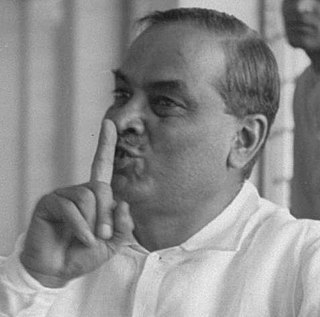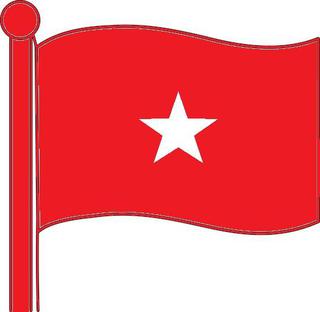Related Research Articles
All India Forward Bloc (Ruikar) was a political party in India, emerging out of split from the All India Forward Bloc.
The United Democratic People's Front was an electoral alliance in West Bengal, India, formed ahead of the 1957 West Bengal Legislative Assembly election. The front was composed of the Jana Sangh, the Hindu Mahasabha, the Revolutionary Communist Party of India (Tagore) and a section of independent Congress dissidents.
The United Left Front was an electoral alliance in West Bengal, India, formed ahead of the 1957 West Bengal Legislative Assembly election. The front comprised the Socialist Unity Centre of India, the Bolshevik Party of India, the Democratic Vanguard and the Republican Party.
The United Left Election Committee was an electoral alliance in West Bengal, India, formed ahead of the 1957 West Bengal Legislative Assembly election. The Committee consisted of the Communist Party of India, the Revolutionary Socialist Party, the Praja Socialist Party, the All India Forward Bloc and the Marxist Forward Bloc. The formation of the electoral alliance was announced at a mass meeting at Shahid Minar in January 1957.
The Price Increase and Famine Resistance Committee was a mass movement in West Bengal, India, formed in late 1958 by the Communist Party of India and other left groups, in response to the ongoing food crisis. The PIFRC led one of the most massive and militant political campaigns in the history of West Bengal. The PIFRC demanded total price controls, immediate redistribution of state lands and confiscations without compensation of excessive private lands owned by landlords. The tactics of PIFRC included scouting for hidden rice storages and forced sales of confiscated rice.
The United Left Front was an electoral alliance in West Bengal, India, formed ahead of the 1962 West Bengal Legislative Assembly election. A key issue that provoked various left parties to join hands was the prevailing food crisis in the state. The front comprised the Communist Party of India, the Socialist Unity Centre of India (Communist), the All India Forward Bloc, the Marxist Forward Bloc, the Revolutionary Communist Party of India, the Bolshevik Party of India and the Revolutionary Socialist Party. The front won 74 seats out of 252.
The United Left Front was an electoral alliance in West Bengal, India, formed in December 1966, ahead of the 1967 West Bengal Legislative Assembly election. The front comprised the Communist Party of India (Marxist), the Samyukta Socialist Party, the Socialist Unity Centre of India, the Marxist Forward Bloc, the Revolutionary Communist Party of India, the Workers Party of India and the Revolutionary Socialist Party. The front won 63 seats out of 280. After the election ULF merged with the People's United Left Front, forming the United Front. The UF formed a state government, dislodging the Indian National Congress for the first time in the state.
The People's United Left Front was an electoral alliance in West Bengal, India, formed in December 1966, ahead of the 1967 West Bengal Legislative Assembly election. The front comprised the Communist Party of India, the Bangla Congress, the All India Forward Bloc and the Bolshevik Party of India. The front won 63 seats out of 280. After the election PULF merged with the United Left Front, forming the United Front. The UF formed a state government, dislodging the Indian National Congress for the first time in the state.
Bangla Jatiya Dal was a political party in West Bengal, India, led by Jahangir Kabir. It was a splinter group of Bharatiya Kranti Dal. Ahead of the 1969 West Bengal legislative assembly election, BJD sought to join the United Front. However, its entry into the United Front was barred by the Bangla Congress. Kabir's brother, Humayun Kabir had been instrumental in bringing down the UF ministry in 1967.
Indian National Democratic Front was a political party in West Bengal, India, led by former Congress minister Ashu Ghosh. Ghosh had taken part in the maneuvers to bring down the United Front cabinet in 1967. However, as he did not become a minister in the P.C. Ghosh-led cabinet that replaced the UF, he revolted and formed the INDF. The INDF had the support of 18 members in the legislative assembly. The INDF pledged support from the governor to form a government in the state. After the INDF split, P.C. Ghosh no longer had a majority in the assembly, and on February 28, 1968, President's Rule was declared.

The West Bengal State Assembly Election of 1952 was a part of the series of Legislative Assembly elections in 1952. It was the first ever assembly election held in West Bengal.

The West Bengal state assembly election of 1957 was part of a series of state assembly elections in 1957.
Socialism in India is a political movement founded early in the 20th century, as a part of the broader movement to gain Indian independence from colonial rule. The movement grew quickly in popularity as it espoused the causes of India's farmers and labourers against the zamindars, the princely class and the landed gentry. After independence and until the early 1990s, socialism shaped some economic and social policies of the Indian government, although they mostly followed the principles of dirigisme. After this period, India moved towards a more market-based economy.
The Workers and Peasants Party (WPP) (also known as the Kirti Kisan Party) was a political party in India, which worked inside the Indian National Congress in 1925–1929. It became an important front organisation for the Communist Party of India and an influential force in the Bombay labour movement. The party was able to muster some success in making alliances with other left elements inside the Congress Party, amongst them Jawaharlal Nehru. However, as the Communist International entered its 'Third Period' phase, the communists deserted the WPP project. The WPP was wound up, as its leadership was arrested by the British authorities in March 1929.
Communism in India has existed as a social or political ideology as well as a political movement since at least as early as the 1920s. In its early years, communist ideology was harshly suppressed through legal prohibitions and criminal prosecutions. Eventually, communist parties became ensconced in national party politics, sprouting several political offshoots.

The Bolshevik Party of India is an Indian political party in India. The party was founded in 1939. The party had a certain role in the trade union movement in West Bengal and was briefly represented in the state government in 1969. In later years the party has played a negligible role in Indian politics.

Legislative Assembly elections was held in the Indian state of West Bengal in 1962.

The West Bengal Legislative Assembly election, 1967 was held in Indian state of West Bengal in 1967 to elect 280 members to the West Bengal Legislative Assembly. United Front led by Ajoy Mukherjee won majority of seats in the election, and formed first non-Congress government of the state.

Legislative Assembly elections were held in the Indian state of West Bengal in 1971. The assembly election was held alongside the 1971 Indian general election.
The Revolutionary Communist Party of India, also known as RCPI (Tagore), was a political party in India, led by Saumyendranath Tagore. RCPI (Tagore) emerged from a split in the Revolutionary Communist Party of India in 1948. RCPI (Tagore) had a very minor role in Indian politics. Tagore served as the chairman of the party. The party published the Bengali fortnightly Ganabani ('People's Voice').
References
- ↑ M.V.S. Koteswara Rao. Communist Parties and United Front - Experience in Kerala and West Bengal. Hyderabad: Prajasakti Book House, 2003. p. 213.
- ↑ M.V.S. Koteswara Rao. Communist Parties and United Front - Experience in Kerala and West Bengal. Hyderabad: Prajasakti Book House, 2003. p. 214.
- ↑ List Of Political Parties Archived 2007-09-30 at the Wayback Machine